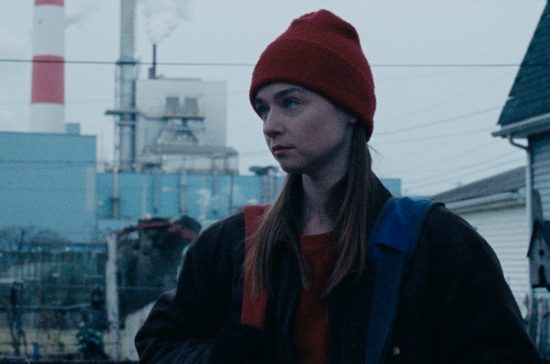TIFF 2020 Review: Holler
Holler focuses on a small Ohio town, peaceful, yet melancholy, a manufacturing plant stands tall, its smokestack one of the last still pushing waste into a winter sky. Within its walls are many of the inhabitants of this town, clinging to the last work left, struggling to make ends meet. Outside, a young woman runs with garbage bags full of aluminum cans, having stolen them to take them to a scrap yard for cash. It’s the only way her and her older brother can try and stay in their home, though Ruth (Jessica Barden) and Blaze (Gus Halper) are hanging by a thread.
The two siblings, left to fend for themselves as their addict mother (Pamela Adlon) gets clean in the county jail, are close, but Ruth is the obvious brains of the operation. She helps local kids with their homework and has an easy eye for numbers. While she has to help make ends meet at home, she keeps up with her schoolwork and Blaze has aspirations of his sister leaving this town for something better. He sends in her college application, and Ruth is readily accepted, but first, she has to be able to afford it. The two begin collecting scrap metal on a larger scale to raise the tuition dollars necessary for Ruth’s escape, but it comes at a cost and with questions – how can Ruth leave her struggling family behind but also break the cycle of poverty and destruction?
First-time feature director Nicole Riegel knows these aren’t easy questions to answer, and isn’t afraid to shy away from an honest and often weighty debut. The few moments of levity, such as when Ruth visits a roller skating rink, bring welcome breaks from the grey wintery colour palette. However, there are times, especially in the back half that are dark, grainy and difficult to make out (though note this was not viewed in a theatre setting due to current COVID protocols, so there may be differences there). Her incorporation of handheld footage is helpful in creating an immersive atmosphere. Reigel brings a keen eye behind the camera and the script, which she also penned, allows us to visualize a rare glimpse into this specific American town and its people. There is no glitz or glamour here, just reality.
Lead actress Jessica Barden (The End of the F***ing World) portrays Ruth, a brave and intuitive character, with such tenacity, that the film never feels bogged down by its serious questions even as the harshness of Ruth’s life plays across her face. She makes Ruth immediately someone you root for and you imagine her ability to escape this place a story for everyone. Always dependable and genuine, Becky Ann Baker has a supporting role as the spirited Linda, a factory worker and family friend who, while a formidable woman, seems like a visual reminder of what could be ahead for Ruth if she doesn’t leave this town.
Holler is a little film with a lot of politics bubbling under the surface. Occasionally they more obviously break through (as in Riegel’s use of Trump footage playing in the background), but they’re always simmering. The opioid epidemic, education costs, healthcare, poverty, unemployment and job loss – all of these matters are touched upon in Holler. Yet, there isn’t time to go into much detail in any one specific issue, and perhaps that’s okay. They all mount up to an unfortunately realistic and overwhelming environment that weigh upon Ruth, Blaze and many of the inhabitants of the town in which they live. In fact they weigh on many of us all. This is a solid debut for Nicole Riegel that brings with it hope and expectation, not just for Ruth, but for her own very bright future.











